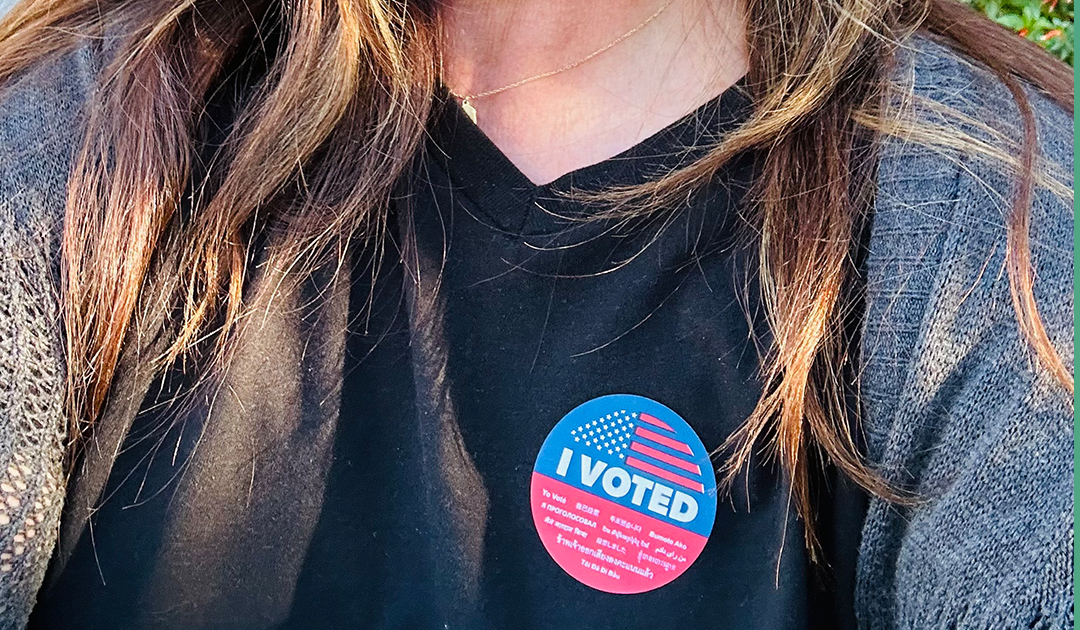The morning after the 2024 Presidential Election, Andrea Tate couldn’t sleep. The candidate she voted for, Kamala Harris, was clearly on the path to defeat. As she browsed social media, she noticed that her husband—who she knew had voted for Donald Trump—had posted on Facebook. He wrote, “God Bless America. God Bless #45-47.” She asked him to take it down, but he refused. She couldn’t stop thinking about it, and that night she wrote a long essay about how this post made her feel, what it was like to be married to someone who voted for the opposite party, and why she had decided to cancel her family’s Thanksgiving and Christmas celebrations.
By two days later, she not only had published that essay—it had been seen by millions of readers on HuffPost and was being discussed on Fox News. She was shocked: she had no idea that her essay would go viral. And the blowback was intense—from strangers online, from her holiday-disinvited in-laws, and even from her husband. Being the center of a media storm placed a massive challenge before their family. “It was rough,” says Tate. “I didn’t know if we were going to make it.”

Now, five months later, she and her husband have survived the maelstrom. And she has turned her brush with viral fame into another essay, in keeping with her identity as a writer. (Tate is an alum of the Antioch MFA in Creative Writing, and she today teaches writing in Antioch University’s undergraduate and Individualized Master of Arts programs, alongside her duties as Senior Academic Advisor for the MA in Clinical Psychology.) This second essay was full of advice to fellow writers. She titled it, “Going Viral: What to do Before, During, and After.” In some ways, the experience was absurd: so many people today are striving to go viral, you might think it would be a great experience. But according to Tate, it’s something you want to be prepared for.
The Good, the Bad, and the Backlash
Following the article, many messages came in, both from the opposing side and the ones that took her side. As the election drew two clear sides, so did Tate’s article. Her critics would quickly emerge, but time would prove that she wasn’t alone, she just had to get through the storm first.
“I think the hardest part was hearing it from Sean Hannity on Fox News. And then Bill Maher,” Tate says. “They were just hammering me the way they do. That’s just entertainment. But being on Fox News I knew it was really getting out there—and I just went into panic mode.”
Though Tate had faced backlash from her husband’s family, she was now receiving grotesque letters and death threats. Many of the platforms discussing her article were right-leaning. She began to feel paranoid. “I didn’t want to leave my house,” she says. “Thank goodness I had a huge German Shepherd. But I would go out and think, ‘Is that a van? Was that van parked there before?’”
Captain Ray Lewis, a former police officer whose face a decade ago became synonymous with the Occupy Wall Street protest, reached out to Tate in support. He told her how brave she had been to post her essay. As Tate remembers, “He reached out to me and said, ‘I really love what you’re doing.’” She was surprised by his support and the support of others who came from displaced communities, including the LGBTQ+ community, and women whose husbands also voted for Trump. This support lifted her spirit.
The Follow-Up Essay
With Tate’s name reaching audiences from all sides of the political scale, she was getting a lot of questions about how she was handling the backlash. “That’s the last thing we need, is for journalists to shut down and writers to not write because of fear,” Tate says. She learned from messages of support from writer friends and groups just how important her piece was, even though the negativity of the article still weighed heavy on her.
Tate eventually decided to write a follow-up piece, one that wasn’t focused on the political conflicts in her home. Her follow-up was titled Going Viral: What to do Before, During, and After. She published it on the Brevity Blog. “I wanted to put this out directly to writers,” says Tate. “It was advice to writers. It wasn’t really a mainstream thing.”
The follow-up piece details her experience and then turns into a “how-to” of how to respond to the experience of writing something that goes viral. There are things to prepare for—like losing friends and family. There’s also advice about how to suppress urges to lash out when you feel as though you’re being cornered for your work. She ends her piece with this: Don’t regret what I wrote, but I do regret not being more prepared. And as the dust of the trolls settles, I can walk with my head held high, knowing I had the courage to say something that millions wanted to hear.
Where the Household Stands Today
This all started with a Facebook post from her husband. He posted, and she needed to write. Though there have been lots of ups and downs, she and her husband made it through a challenging time. “We’re really good,” she says. “There’s still a rift with his family, but the important relationship is with my husband, and we’re good.”
She did, however, follow through on canceling the big family holiday celebrations. And she has tried to explain to her in-laws that she didn’t write about the experience with the intention of hurting their feelings. “I know it’s hard for you to understand,” she says, “because, you’re not artists, you’re not writers—but this is what we do.” She goes on, “I tried to do everything possible to tell my story, in my point of view, and [to share] what was happening to me—and also to respect you by saying you’re good people and I love you.” Unfortunately, they wouldn’t meet eye to eye.
“Christmas came, and he got presents, and I didn’t get anything,” explains Tate.
After pursuing counseling, Tate and her husband have settled on some ground rules. No political discussions, and no posting about politics. Though Tate isn’t currently talking to her husband’s family, she doesn’t regret what she did. “For years, I wasn’t myself in that family. I just bit my tongue,” she says. “I really don’t recommend people having a division in their family, but I also don’t recommend you staying quiet and not being your authentic self.”
Though Tate is still receiving threats six months later, she doesn’t regret her decision to write the article. She has gone on to discuss the essay and her own situation on podcasts and news segments. Every interview she does, the first question is always the same: How are you and your husband doing?
“That tells me a lot,” says Tate. “It tells me that people are mostly wanting to know how the relationship is going. And that’s what the piece was about.”




